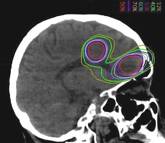The brain is the center of thought, memory, emotion, speech, sensation and motor function. The spinal cord and special nerves in the head called cranial nerves carry and receive messages between the brain and the rest of the body.
- There are two types of brain tumors:
- Primary — a tumor that starts in the brain. Primary brain tumors can be benign (not cancerous) or malignant (cancerous). Primary tumors in the brain or spinal cord rarely spread to distant organs.
- Metastatic — a tumor caused by cancer elsewhere in the body that spreads to the brain. Metastatic brain tumors are always cancerous.
- Brain tumors cause damage because, as they grow, they can interfere with surrounding cells that serve vital roles in our everyday life.
Facts About Brain Tumors
- The Central Brain Tumor Registry of the United States estimates that more than 359,000 persons are living with the diagnosis of primary brain and central nervous system tumors in the United States.
- An estimated 43,800 new cases of primary benign and malignant brain and central nervous system tumors are expected to be diagnosed in the United States this year.
Treating Brain Tumors
If doctors determine that you have a tumor, the treatment options and prognosis are based on the following factors:
- Tumor type.
- Location and size of tumor.
- Tumor grade (how abnormal the cells are).
- Your age, medical history and general health.
Understanding Radiation Therapy
Radiation therapy, sometimes called radiotherapy, is the careful use of radiation to safely and effectively treat many different kinds of tumors. Radiation therapy is used with an intention to either kill tumors, to control tumor growth or to relieve symptoms.
- Radiation therapy works within tumor cells by damaging their ability to multiply. When these cells die, the body naturally eliminates them.
- Healthy cells near the tumor may be affected by radiation, but they are able to repair themselves in a way tumor cells cannot.

Radiation Therapy Options for Brain Tumors
People with brain tumors should discuss treatment options with a number of cancer specialists, including a radiation oncologist. A radiation oncologist is a doctor who will help you understand the types of radiation therapy available to treat your tumor. Radiation therapy treatment options for brain tumors include:
- External beam radiation therapy.
- Brachytherapy or internal radiation therapy.
Depending on your tumor, you may also undergo surgery and/or chemotherapy, either before or after radiation.
External Beam Radiation Therapy
External beam radiation therapy involves a series of daily outpatient treatments over several weeks to accurately deliver radiation to the brain. Radiation is often given after surgery, and sometimes it is used instead of surgery.
3-dimensional conformal radiotherapy (3D-CRT) combines multiple radiation treatment fields to deliver precise doses of radiation to the brain. Tailoring each of the radiation beams to the patient's tumor allows coverage of the diseased cells while keeping radiation away from nearby organs, such as the eyes.- Intensity modulated radiation therapy (IMRT) is the most recent advance in the delivery of radiation. IMRT differs from 3D-CRT by modifying the intensity of the radiation within each of the radiation beams.
Stereotactic radiotherapy, sometimes called radiosurgery, is a type of external beam radiation therapy that pinpoints high doses directly on the tumor, in some cases in only one treatment. At some centers, stereotactic radiotherapy is called by the name of the company that makes the equipment. - X-rays, electrons and protons are all types of energy used in external beam radiation therapy.
Newer Techniques
Doctors are constantly exploring newer and better ways to treat primary brain tumors.
- Drugs that make tumor cells more sensitive to radiation are called radiosensitizers. Combining radiation with radiosensitizers may allow doctors to kill more tumor cells.
Possible Side Effects
- Side effects from radiation can include fatigue, hair loss where you received radiation, scalp irritation and muffled hearing. These will usually resolve a month or so after treatment. However, you hair might not grow back exactly as it was before treatment.
- Radiation may also cause some short-term memory loss and difficulty thinking.
- Side effects are different for each person. Medications may be prescribed to make you as comfortable as possible.
- If at any time during your treatment you feel discomfort, tell your doctor or nurse. They can prescribe medicine to help you feel better.
- Be sure to talk to your radiation oncologist before you start treatment, to make sure you understand what side effects are common for your treatment and how best to handle them.
Caring for Yourself During Treatment
 Get plenty of rest during treatment, and don't be afraid to ask for help.
Get plenty of rest during treatment, and don't be afraid to ask for help. - Follow your doctor's orders. Ask if you are unsure about anything. There are no stupid questions.
- Tell your doctor about any medications or vitamins you are taking, to make sure they are safe to use during radiation therapy.
- Eat a balanced diet. If food tastes funny or if you're having trouble eating, tell your doctor, nurse or dietician. They may be able to help you change the way you eat.
- Treat the skin exposed to radiation with special care. Stay out of the sun, avoid hot or cold packs, only use lotions and ointments after checking with your doctor or nurse, and clean the area with warm water and mild shampoo or baby shampoo.
- Battling cancer is tough. Seek our help from support groups and friends.


